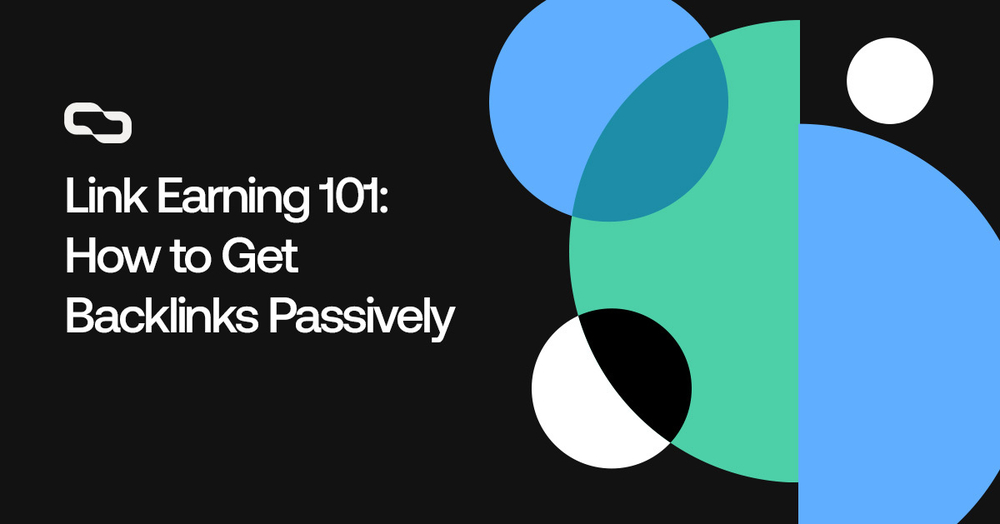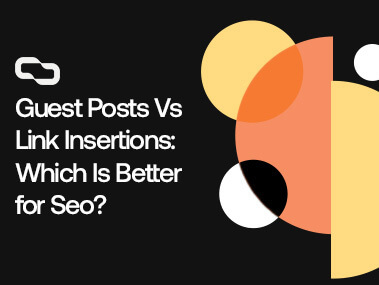Get links on brand new relevant articles for a boost of Authority and Relevance that’ll catapult your SEO. Our links include both DR and Traffic, so you don’t have to choose between one or the other.

Finding quality backlinks is hard.
When I first started link-building 5 years ago, my strategy was to offer free guest posts.
And boy oh boy, I struggled to even get 1 link per month.
As I got more and more experienced, I understood that the problem wasn’t in the content I was offering but in the approach I was using.
In this guide, I’ll share the 20 most effective strategies I’ve learned over the years to build quality backlinks.
From utilizing unlinked brand mentions to using guest posts the right way.
I’ll not hold back any secrets — you’ll learn the insider tactics that we use at the agency to build thousands of links per month.
What Is a Quality Backlink?
A quality backlink typically comes from a reputable, relevant source, and it’s integrated seamlessly into high-quality content, adding value rather than appearing as forced or out of place.
These links help improve a site’s visibility and ranking in search engine results, driving organic traffic and enhancing the credibility of your website.
In the following sections, we’ll explore various strategies for acquiring these valuable backlinks.
Strategies to Acquire High-Quality Backlinks
1. Reverse Engineer Competitors
Understanding what works for your competitors can be a game-changer in your link-building strategy.
Start by identifying competitors who rank well for your target keywords.
Use tools like Ahrefs or SEMrush to analyze their backlink profiles.
Look for patterns and common sources in their backlinks.
This insight can help you determine what type of link-building technique works best in your niche.
Plus, it provides you with a list of prospects to kickstart your link-building campaign.
2. Publish Ultimate Guides
Ultimate guides are comprehensive, authoritative pieces of content covering a topic in exhaustive detail.
They are valuable because they attract backlinks naturally due to their depth and utility.
The trick to this link-building tactic is to find topic ideas where your audience is underserved and create content that fills these gaps.
Dive deep into subjects that are both relevant and complex, offering insights that are not readily available elsewhere.
Your guide should be the go-to resource for that topic, providing answers to every possible question a reader might have.
This approach not only establishes your authority in the niche but also encourages other websites to link to your guide as a definitive source.
Agency Tip: Update your guides regularly to keep them current and maintain their value as a link-worthy resource.
3. Conduct Original Research
Original research and unique data can set your content apart, making it a magnet for quality backlinks.
Conduct surveys, compile industry data, or analyze existing data in new ways to create compelling content.
This type of content often gets cited by high-authority websites, earning you good backlinks.
Agency Tip: Ensure your findings are presented in an engaging way to maximize their impact.
4. Create Tools
Creating useful online tools, like calculators or templates, can attract backlinks.
These tools should address specific needs within your industry.
They don’t have to be complex, but they should provide genuine value to your audience.
Once developed, promote these tools through your channels and reach out to websites that might find them useful.
Agency Tip: Don’t be a copycat. Try to find unique tool ideas for your audience.
5. Engage in Proactive PR
Platforms like HARO (Help A Reporter Out) connect journalists with sources.
By signing up and responding to relevant queries, you can get quoted in articles with a backlink to your site.
This strategy requires consistency and quality responses but can be highly effective for earning authoritative backlinks.
For more information, check our blog post on how to get backlinks from HARO.
6. Partner with Brands that Complement Yours
Collaborating with complementary brands can lead to link opportunities.
For example, if you’re a real estate agent, you can collaborate with a landscaping or a moving business.
These aren’t direct competitors but they complement your business.
You can co-create content, participate in webinars, or engage in cross-promotion.
These partnerships often result in high-quality content that benefits both parties and attracts backlinks due to its value and unique insights.
7. Use The Skyscraper Technique
The Skyscraper Technique involves finding popular content in your niche, creating a better version of it, and then reaching out to sites that link to the original content.
This link-building approach sounds similar to publishing ultimate guides, however, there is a key difference.
The skyscraper technique is about writing better content than your competitors to steal their links and outrank them.
This means that your content must be SEO optimized, you have to match the search intent, and follow all the other SEO best practices.
The ultimate guides approach, however, doesn’t really care about optimizing the guide for search engines.
8. Creating High-Quality Infographics
Infographics are effective for link building because they present information in an engaging, visual format.
Create infographics that are informative and visually appealing, and share them on social media, infographic directories, and with influencers in your niche.
They can get shared widely, resulting in backlinks.
Agency Tip: Submit your unique photos or infographics to free image websites like Pexels and Pixabay, then reach out to people using your images asking for attribution.
9. Provide Testimonials
Businesses often feature testimonials on their websites to show social proof.
These testimonials usually include a manual link back to the provider’s site, making it a great way to earn good backlinks.
The trick is to build a relationship with the site owner and show genuine interest in their product.
Agency Tip: Engage with the business owner on social media, offering unique insights or asking good questions. This highly increases the chances of them accepting your testimonial.
10. Guest Blogging
With advancements in AI writing tools and bloggers becoming more aware of the value of backlinks, simply offering “SEO-optimized” content doesn’t work anymore.
That’s why you need to get a little creative.
The best way to build backlinks with guest posts is to reverse engineer your competitors’ competitors.
Let me explain how that works.
First, find a low-authority website in your niche that is getting good traffic.
Next, use tools like Ahrefs or SEMrush to analyze these websites to find keywords that your prospects are missing.
With this information, you craft a tailored pitch to your prospects, demonstrating how they’re missing out on potential traffic and rankings.
You offer to write a free article focusing on these high-potential keywords, thereby presenting a solution to improve their SEO and capture untapped traffic.
Agency Tip: Back up your pitch with data. Show the potential traffic or engagement metrics that similar content has garnered on other sites. Concrete data can be very persuasive in showing the value you bring to the table.
11. Resource Page Link Building
Here’s the deal: resource pages exist to provide valuable information to their audience. They’re like a treasure chest of helpful links on specific topics.
Your goal? To be one of those gems.
Start by hunting for resource web pages that fit your niche. Use simple Google searches like “[your topic] + resources” or “[your industry] + helpful links.” You’ll be surprised at the gold mine you’ll discover.
Once you’ve got your list, it’s time to reach out. But hold on! Don’t just blast them with a generic email. Personalize it.
Explain briefly why your content adds value to their page. Remember, it’s about how they benefit, not just you.
Make sure to check our link building outreach guide to know exactly how it’s done.
12. Broken Link Building
Broken link building is like being a digital detective and a helpful hand all in one.
It’s about finding broken links on websites, and then offering your content as a replacement.
It’s a win-win: websites clean up their act, and you get a good quality link.
Your mission begins with finding those broken links.
Tools like Ahrefs, SEMrush, or even free Chrome extensions can help you sniff them out.
Look for websites in your niche, and run a quick scan.
Keep an eye out for 404 errors — these are your targets.
13. Unlinked Brand Mentions
These are instances where your brand is mentioned but not linked.
Turning these mentions into backlinks is a clever, yet often overlooked white-hat link-building strategy.
The first task is to locate where your brand is being talked about.
Use tools like Google Alerts, BuzzSumo, or Mention.
Set them up to alert you whenever your brand is named online.
Once you’ve got a mention, check it out.
Is it positive? Does it fit well with your brand’s image?
Context matters. You want links from sources that align with your brand’s values and messaging.
Once you’ve found quality brand mentions, it’s time to reach out.
Craft a friendly, personalized email to the website owner or author.
Thank them for mentioning your brand and politely ask if they’d consider a link insertion.
Remember, appreciation first, request second.
14. Use PR
Leveraging Public Relations (PR) in your one way link-building strategies arsenal is like playing a sophisticated game of chess.
It’s about positioning your brand in the right place, at the right time, and with the right message to capture attention and earn quality links.
Start by identifying what’s unique about your brand.
Do you have a groundbreaking product, an interesting survey result, or a compelling company story?
Your aim is to create a narrative that’s not just promotional but genuinely interesting to your target audience and relevant to your industry.
The next step is to build a media list.
Who’s going to be interested in your story?
Research and build a list of journalists, bloggers, and influencers who cover topics related to your niche.
Focus on quality over quantity.
It’s better to have a smaller list of highly relevant contacts than a large list of generic ones.
15. Become a Podcast Guest
Being a guest on relevant podcasts can earn curated backlinks, as most podcasts have websites where they list their episodes with links to their guests’ websites.
This also helps in building your brand and reaching a broader audience.
Your first move is to find podcasts that resonate with your brand and audience.
Look for shows that discuss topics in your industry or those that your target audience listens to.
Use podcast directories like Apple Podcasts, Spotify, or specific podcast search engines to aid your search.
Once you’ve shortlisted podcasts, craft a compelling pitch.
Highlight what makes you a valuable guest: your expertise, unique perspectives, or interesting stories you can share.
Tailor each pitch to the podcast’s theme and audience.
16. Interview Industry Leaders
Interviewing industry leaders and experts not only provides valuable content for your audience but can also lead to backlinks.
The interviewee is likely to share the interview with their followers, increasing your content’s reach and potential for natural backlinks.
17. Leverage Local Partnerships
If you have a local business or a physical presence, partnering with other local businesses or participating in community events can lead to backlinks from local websites, like news outlets, community blogs, or local directories.
These local backlinks can be particularly valuable for improving local SEO.
18. Offer Scholarships or Grants
If applicable to your business, offering scholarships or grants can result in backlinks from educational institutions and relevant industry websites.
Create a dedicated page on your website for the scholarship and reach out to educational institutions to list your offer.
19. Host Competitions or Giveaways
Online contests or giveaways can attract a lot of attention and editorial backlinks from various sources. Promote your event extensively across different platforms to maximize visibility.
20. Participate in Forums and Online Communities
Engage in forums and online communities relevant to your industry.
By providing valuable insights and advice, you can establish yourself as an authority, leading to natural backlink opportunities when users reference your contributions.
If you need to learn more about this link-building tactic, check our forum link-building guide.
FAQs
What Are the Most Effective Strategies for Building High-Quality Backlinks?
Effective strategies for building high-quality links include creating shareable content, guest posting on reputable sites, engaging in industry forums, and forming partnerships with influencers in your niche.
How Does the Relevance of the Linking Site Affect the Quality of the Backlink?
The relevance of the linking site significantly impacts backlink quality. Links from sites closely related to your content or industry are more valuable, as they are seen as more authoritative and relevant by search engine algorithms.
Can Guest Blogging Be an Effective Way To Gain Quality Backlinks?
Guest blogging can be highly effective for acquiring good backlinks. By providing valuable content on other reputable sites in your industry, you gain exposure and earn backlinks that enhance your site’s credibility.
How Do I Measure the Impact of Backlinks on My Website’s SEO Performance?
To measure the impact of backlinks on SEO performance, track metrics such as referral traffic, site ranking improvements, the domain authority of backlink sources, and organic search traffic increases.
Can You Buy Quality Backlinks?
You can buy quality backlinks packages. However, you must be careful with whom you buy links from. Make sure to only buy links from reputable sources, as many low-quality agencies can sell you toxic links that can do more harm than good.
Conclusion
Building a strong backlink profile is a marathon, not a sprint.
Focus on building relationships and providing value to website owners, and good backlinks will follow.
Need a hand?
Reach out to us, and we’ll help you navigate the backlink landscape with a custom strategy designed just for you.
Find out your exact cost of ranking for your dream keyword
Find out nowLet’s get you ranking now
If you want the team at Get Me Links to help you get more traffic
Book a call NOW Back to Blog
Back to Blog 12 Minutes Read
12 Minutes Read


